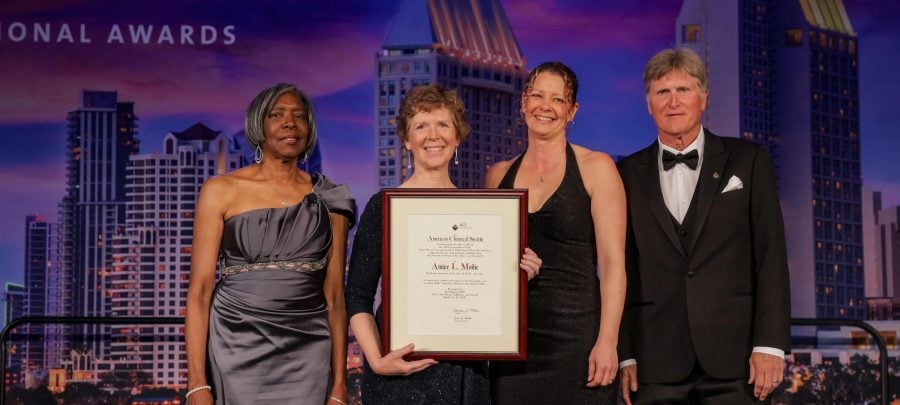
Michigan Tech chemistry alumna Amiee (Larchar) Modic ’84 earned the 2025 James Bryant Conant Award in High School Chemistry Teaching for her authenticity, enthusiasm, and ability to inspire.

Michigan Tech chemistry alumna Amiee (Larchar) Modic ’84 earned the 2025 James Bryant Conant Award in High School Chemistry Teaching for her authenticity, enthusiasm, and ability to inspire.
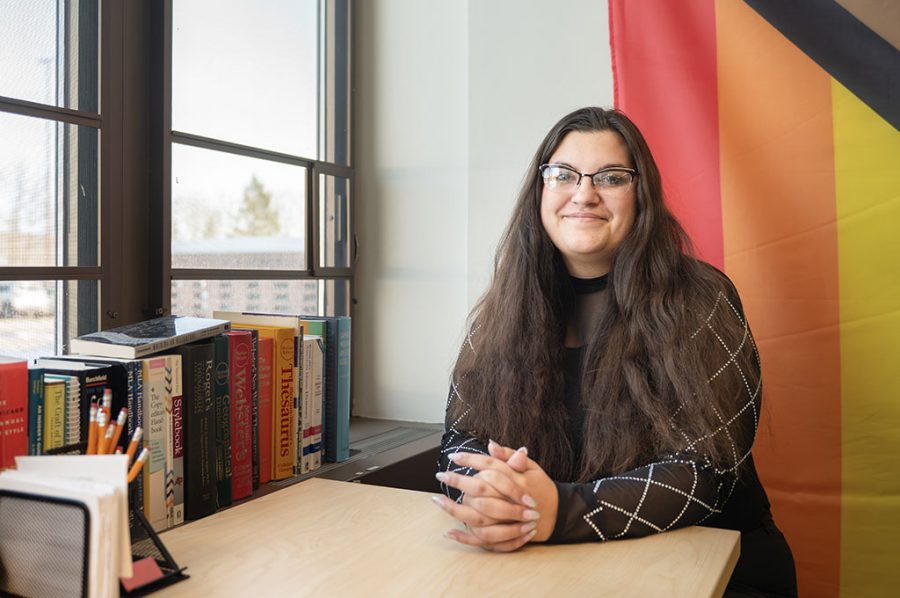
Mary Christine Stevens, undergraduate student speaker for the 2025 spring commencement, has sampled much of what Michigan Tech has to offer during her time as a student—a philosophy she happily passes on to current and future students. As Stevens prepares to graduate from Michigan Tech and Pavlis Honors College, she looks back on the time spent earning her bachelor of arts in English with a minor in French, she recalls the advice she received from her father when she first started her college journey.
“He told me to try everything,” Stevens said. “College is the last time in life you’ll have this much freedom and these few responsibilities.”
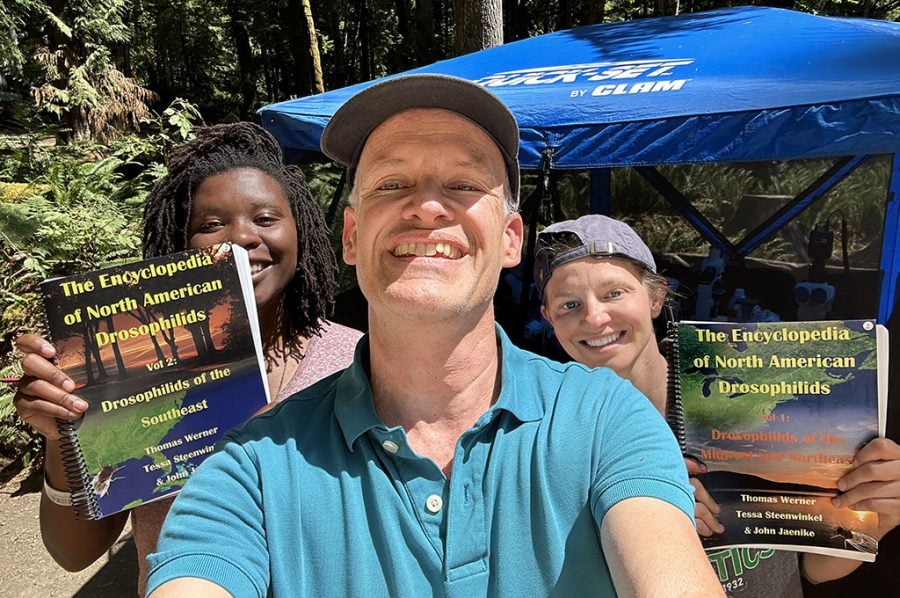
Thomas Werner, a North American fruit fly expert, entomologist and biological sciences professor of genetics and developmental biology is celebrating the release of his latest volume documenting fruit flies across the continent—and Huskies are invited.
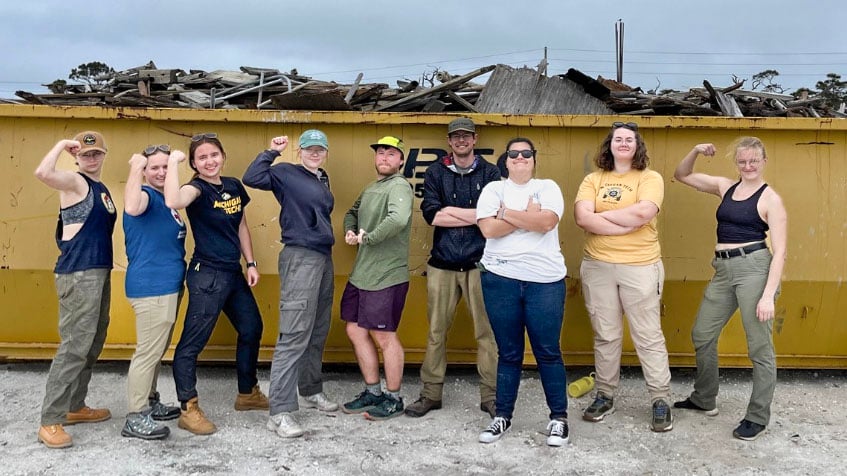
Whether it’s a rave in the hot sun throwing beach balls and sipping fruity drinks or a long, relaxing week on the couch, the spring-breaker stereotype doesn’t typically involve long hours of learning and labor. But thanks to Michigan Tech Student Leadership and Involvement (SLI), Huskies have options. Alternative Spring Break (ASB) gives students across campus the opportunity to spend their time off serving communities around the world—and having a different kind of fun in the process.
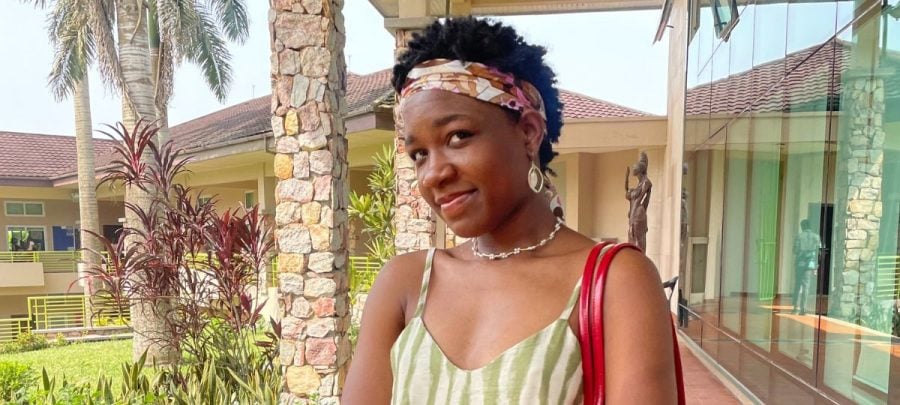
Nyasha Milanzi wasn’t entirely surprised to win the Rising Black Scientists Award. She had a feeling. And she’d worked hard on her application.
“This is probably coincidental, but I actually wrote in my diary that I was going to win the prize after I submitted it,” said the graduate research assistant, who is slated to receive her master’s degree in sustainable communities this year. “I felt my essay was well written and thought I was going to win the prize, so I wrote it down.”
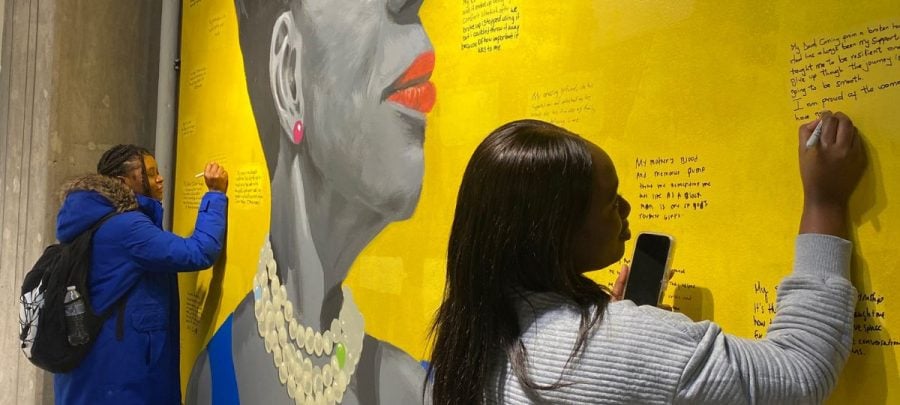
Michigan Tech visual and performing arts students explore big questions through art. Allison Lewis ’26, a theatre and entertainment technology major and art minor, approached the final project for her art and design class by inviting others to share their experiences. The project prompt, “the human condition,” inspired Lewis’ interactive mural of her mother.
The size of the project is deliberate.“My mom is a really large influence in my life and I feel like I carry her with me the most,” said Lewis, “I wanted to not only celebrate her but let people celebrate the people in their lives who influenced them and who they are made up of.”
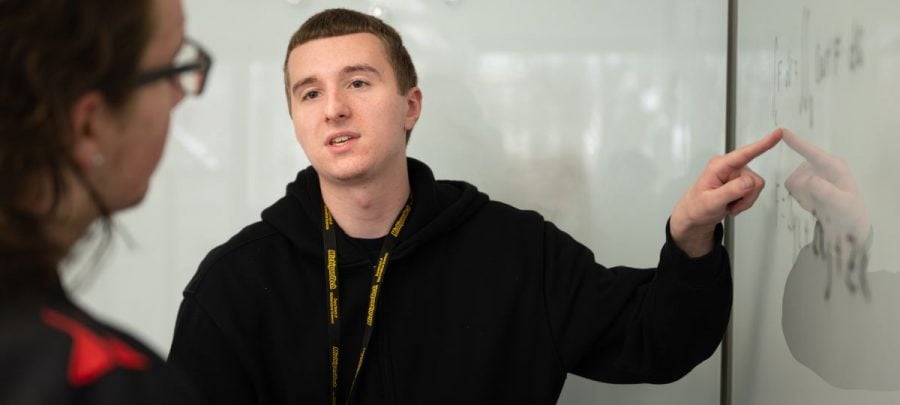
Discrete mathematics student McCoy Ziehl and fellow Michigan Tech Class of 2025 member Emily Ruf, who is double-majoring in statistics and discrete mathematics, share an inside look at what MTU math majors do in and out of the classroom.
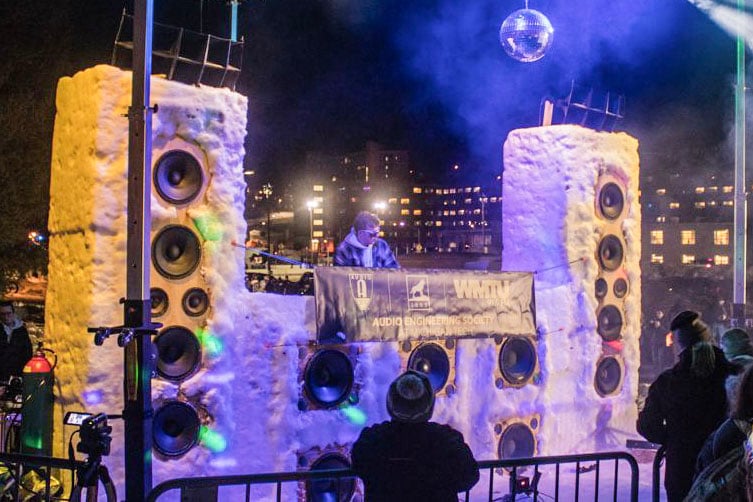
Every year students come together to turn Michigan Tech’s snowy campus into a wonderland of snow statues during Winter Carnival. For many years, the Audio Engineering Society (AES) has provided the soundtrack for the traditional All-nighter, bringing the energy with their signature snow speakers and a rotating cast of volunteer DJs.
Built in the center of the action on Walker Lawn between broomball courts and Husky Plaza, the snow speakers spread music across campus, livening the spirits of statue builders, volunteers, and visitors.
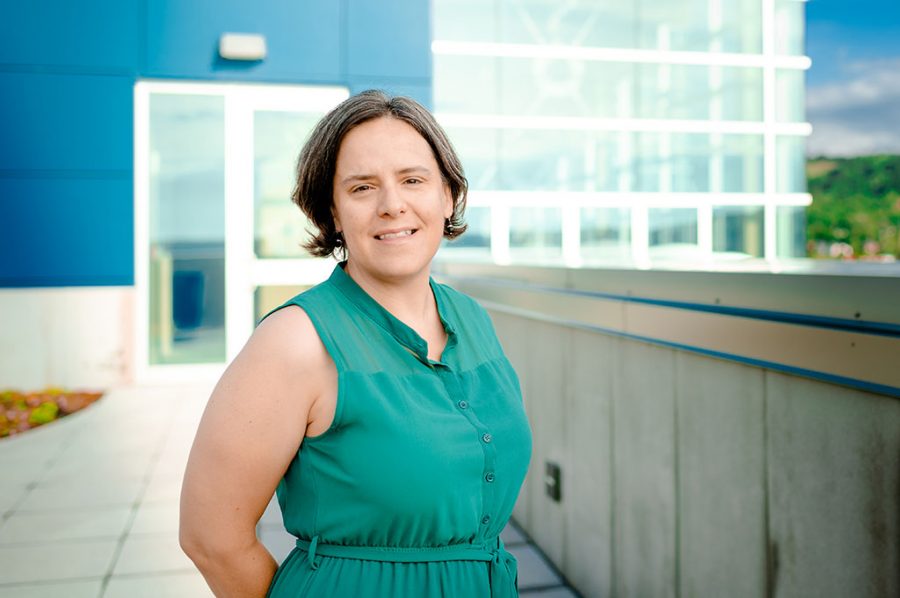
Biological Sciences professor Amy Marcarelli is the proud co-editor of recently published Foundations of Stream and River Ecology: A Guide to the Classic Literature. The book is a continuation of the University of Chicago Press Foundations of series, which began with the first publication of Foundations of Ecology over 30 years ago. The series had temporarily lapsed in publications as resources for academic papers shifted to digital availability, but has been brought back with a new perspective in this latest addition.
Previous editions in the series reprinted academic research papers in their entirety, with a brief introduction explaining the editors’ reason for including those particular papers. The goal, Marcarelli said, was to get these foundational papers into the hands of graduate students and others exploring a new field. Now that academic papers are more readily available online, Marcarelli and her co-editors took a different approach with their compilation.
“If you don’t know the original literature you run the risk of reinventing the wheel.”
– Amy Marcarelli, biological sciences
The book is designed to not only refer researchers to classic literature in the field, but to provide additional context to each paper’s place in the history of stream and river ecology. Instead of fully reprinting each paper, the book is presented as an annotated bibliography with summaries of each paper, and a “looking forward” section highlighting changes to the field after those papers were published.
This book is also the first comprehensive work of its kind in the relatively new field of stream and river ecology. While most established labs and courses have a recommended reading list passed down by mentors, Marcarelli said this is the first compilation published with additional context for those papers. Most papers included in the book were published before the 2000s, which was an intentional reaction to the modern landscape of digital research paper databases.
“When students go to do research there is sort of a sense that newer papers are better or sometimes it is more difficult to find older papers,” said Marcarelli, “Some of those indexes don’t go much before the mid-80s or they have poor coverage of papers before then.”

Marcarelli and her co-editors have found many seeds of unexplored ideas and unanswered questions still exist within older, classic papers and wanted to bring them to students’ attention.
“A lot of those early papers have a lot in them, and they get cited for one thing but there is so much more material and ideas embedded in those. Things that in our current, concise, very focused scientific writing style we don’t include in our modern papers but they are certainly there in the older papers,” said Marcarelli.
Marcarelli was invited to the project by her long-time colleague and lead editor Wyatt F. Cross. While she has never done research directly with Cross or her other co-editors, Jonathan P. Benstead and Ryan A. Sponseller, they have all collaborated in their shared field for many years and are members of the Society for Freshwater Science. The project was created with editors from a variety of backgrounds to provide additional perspectives, and that intentionality carried over to discussions of diversity when editing the book.
One of Marcarelli’s major contributions to the book was reconciling who did the research behind each paper and why, as well as who may have been excluded from the table in the past.
“You can’t discount the work that was done in the past because it was done in a culture where some people had opportunities and some didn’t, but you also have to be careful not to exacerbate past sins, for lack of a better word,” said Marcarelli.
Though Marcarelli said stream and river ecology has had key female leaders since the 1970s, representation in the field has still been predominantly male and white. Editors focused especially on highlighting diverse voices of up and coming researchers in the book’s “looking forward” sections. Their journey to encourage diversity in the field is expressed in greater detail in the book’s forward and epilogue.
“We talked a lot about not just paying attention to things like citation count. Thinking about where there might be papers by groups or people that maybe haven’t been recognized as as important as they should be and trying to highlight those where possible,” she said, “not just thinking about gender diversity, but also about geographic diversity.”
Copies can be purchased through The University of Chicago Press. Marcarelli also plans to make copies available in the J. Robert Van Pelt and John and Ruanne Opie Library as well once they have been shipped to her.
The College of Sciences and Arts is a global center of academic excellence in the sciences, humanities, and arts for a technological world. Our teacher-scholar model is a foundation for experiential learning, innovative research and scholarship, and civic leadership. The College offers 33 bachelor’s degrees in biological sciences, chemistry, humanities, kinesiology and Integrative physiology, mathematical sciences, physics, psychology and human factors, social sciences, and visual and performing arts. We are home to Michigan Tech’s pre-health professions and ROTC programs. The College offers 25 graduate degrees and certificates. We conduct approximately $12 million in externally funded research in health and wellness, sustainability and resiliency, and the human-technology frontier.
Follow the College on Facebook, Instagram, LinkedIn, X and the CSA blog. Questions? Contact us at csa@mtu.edu.
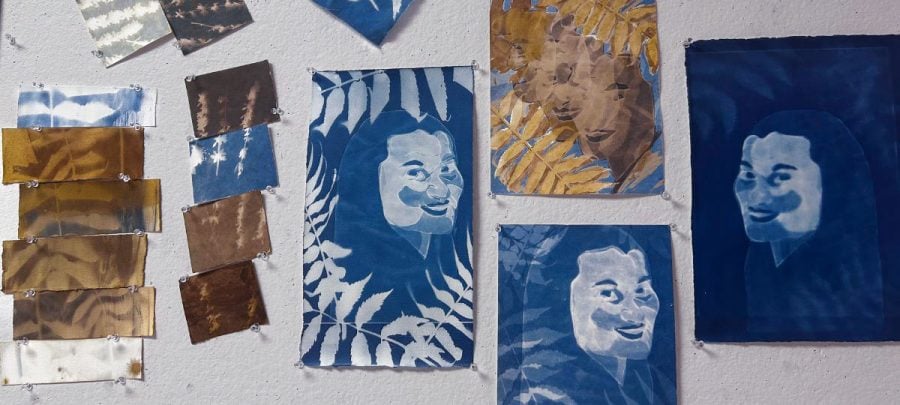
For some students pursuing technological careers, the world of art might feel foreign and intimidating. In her Art and Flora course, Visual and Performing Arts Professor Anne Beffel encourages students to be as comfortable experimenting in the studio as they are in the lab.
“Setting the stage for students to know their own sense of aesthetic is one of the most important things I can do so that when they leave this class they are making work that is relevant to them and how they view the world rather than following a prescribed path,” said Beffel.